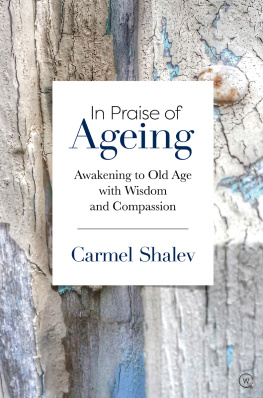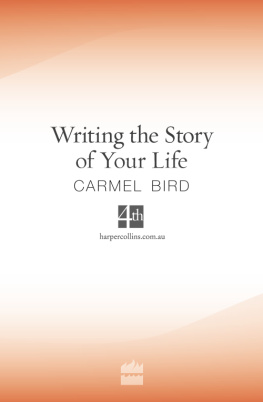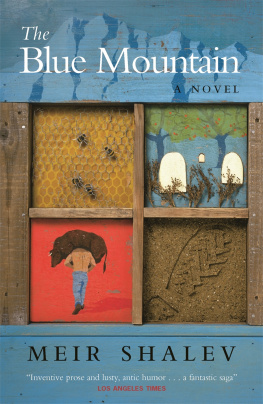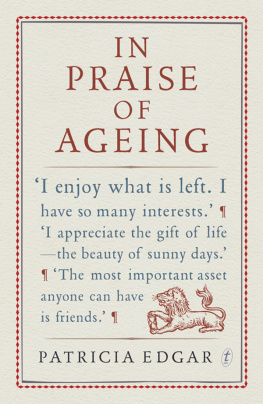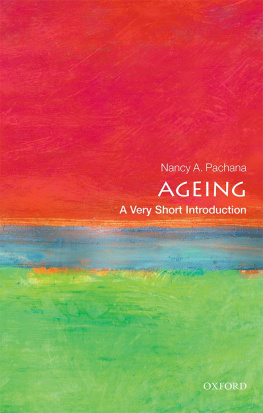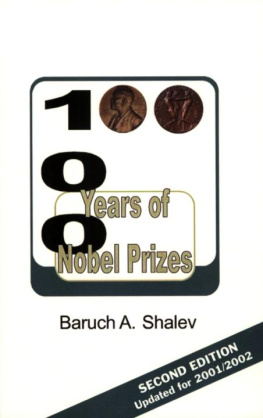Carmel Shalev - In Praise of Ageing
Here you can read online Carmel Shalev - In Praise of Ageing full text of the book (entire story) in english for free. Download pdf and epub, get meaning, cover and reviews about this ebook. year: 2020, publisher: Watkins Media, genre: Romance novel. Description of the work, (preface) as well as reviews are available. Best literature library LitArk.com created for fans of good reading and offers a wide selection of genres:
Romance novel
Science fiction
Adventure
Detective
Science
History
Home and family
Prose
Art
Politics
Computer
Non-fiction
Religion
Business
Children
Humor
Choose a favorite category and find really read worthwhile books. Enjoy immersion in the world of imagination, feel the emotions of the characters or learn something new for yourself, make an fascinating discovery.
- Book:In Praise of Ageing
- Author:
- Publisher:Watkins Media
- Genre:
- Year:2020
- Rating:4 / 5
- Favourites:Add to favourites
- Your mark:
- 80
- 1
- 2
- 3
- 4
- 5
In Praise of Ageing: summary, description and annotation
We offer to read an annotation, description, summary or preface (depends on what the author of the book "In Praise of Ageing" wrote himself). If you haven't found the necessary information about the book — write in the comments, we will try to find it.
In Praise of Ageing — read online for free the complete book (whole text) full work
Below is the text of the book, divided by pages. System saving the place of the last page read, allows you to conveniently read the book "In Praise of Ageing" online for free, without having to search again every time where you left off. Put a bookmark, and you can go to the page where you finished reading at any time.
Font size:
Interval:
Bookmark:


This edition first published in the UK and USA in 2020 by
Watkins, an imprint of Watkins Media Limited
Unit 11, Shepperton House
89-93 Shepperton Road
London
N1 3DF
Design and typography copyright Watkins Media Limited 2020
Text copyright Carmel Shalev 2020
Carmel Shalev has asserted her right under the Copyright, Designs and Patents Act 1988 to be identified as the author of this work.
All rights reserved.
No part of this book may be reproduced or utilized in any form or by any means, electronic or mechanical, without prior permission in writing from the Publishers.
1 3 5 7 9 10 8 6 4 2
Designed by XXX
Typeset by Lapiz
Printed and bound in XXX
A CIP record for this book is available from the British Library
ISBN: 978-1-78678-387-5 (Paperback)
ISBN: 978-1-78678-430-8 (eBook)
www.watkinspublishing.com
In memory of my mother, Frances Elman, whom I loved more as she aged.
CONTENTS
Life is swept along, short is the life span.
For one swept on by ageing no shelters exist. Seeing this peril in death,
Do good deeds that bring happiness.
(The Buddha, Dvejana Sutta, Anguttara Nikaya 3.51)
FOREWORD
This book is a personal contemplation on a sore and silenced subject ageing. My parents were for me great teachers in this respect, especially in their last years, which were replete with suffering and sorrow. Theirs was the first generation to enjoy the boons of scientific advances in medicine that brought about long life. Populations all around the world are now ageing, with women outliving men, but often the companion of old age is woe. Long life does not necessarily come with quality of life. And the society in which we live is rife with prejudice against people of old age. I view this through critical eyes, conditioned by the political bent of a career as a scholar engaged in ethical issues of gender, human rights and the medicalization of life processes.
I am sixty-five years old and in the autumn of my own life. I ask myself how I would like to live the years that still remain. I wonder what I should do while I still can. I ponder this from a world view gleaned from the dharma, the teachings of Siddhatta Gotama, known as the Buddha, two thousand five hundred years ago. This wisdom views ageing as an inescapable natural process and as an occasion for personal growth. We are subject to birth, ageing, sickness and death just as all living phenomena appear and decline, grow and decay. This process of ongoing change can evoke discontent. But if we bring caring attention to what we are experiencing, we may distinguish those difficulties that are unavoidable from those that are born from our attitude toward whatever is unfolding.
I am of a generation that found freedom and was revolutionary in its youth. This book is a call to embrace our ageing, redefine the role of elders in our communities, and create an old age that is beneficial to ourselves and others. My personal testimony and views reflect the inner understanding of one person who asks, What is this? over and over again. Because I am no different in essence from you, the reader, despite our diverse cultural settings, you may find voices in my musing that resonate with the world you experience personally.
I draw upon the ancient wisdom of the dharma to the best of my limited understanding. I came to it in mid-life on my first meditation retreat, led by a Westerner who had spent years in Thailand as a forest monk in the Theravada tradition. A visit to India a few years later exposed me to the teachings and practices of the Mahayana tradition of Tibet. I read some books about Buddhism, but for many years I learned mostly from practising meditation and listening to dharma talks. Only later did I find an interest in any formal study of the canonical texts, and even then my efforts depended on coincidental opportunities and were rarely systematic. The access I have to the early Pali texts in which the ancient teachings of Gotama were originally preserved comes from the translations of scholars into either English or Hebrew. In a few instances, the quotes I bring of teachings from these early sources are the result of comparing several translations in the two languages and taking license to rephrase them in my own words. I take full responsibility for any misunderstandings.
Over the years I had the good fortune to meet many teachers and friends who offered the wisdom of the Buddha Gotama. I am grateful to them all and, above all, to Stephen Batchelor for his learned creativity and eloquence in presenting a coherent view of a secular Buddhism, and for portraying Gotama as the historical non-fiction figure of a remarkably gifted human being, rather than a god, whose teachings shed light on our shared humanity and offer guidance on how to flourish in this life.
The book is the fruit of hundreds of talks and discussions that I led in Israel over a period of five or six years with small groups of people more or less my age. In them we practised meditation and compassionate listening as we talked about our lived experiences of ageing. I am grateful to all the women and men who took part in these meetings, shared their personal stories and insights, and gave me the opportunity to explore our common experience of growing old. I am especially thankful to Rachel Shkedy, for being a faithful partner for so many years in organizing these meetings as part of Wisdom of Ageing, a movement of socially engaged Buddhism for ageing well.
I would also like to thank those who took time to read drafts of the Hebrew and English manuscripts and whose comments contributed to the final form of the book: Esti Ayali, Mira Nathan, Yoav Lorch, Nurit Guttman, Yifat Mentel, Eran Harpaz, Ada Avshalom, Tami Gitlitz, Mary Rudolf, Olivia Bezalel, Annie Saunders, Terri Cole, Edith Sobel, and my dear aunt Marjorie Tuckman.
REALITY
CHAPTER 1
GOING FORTH
Once I heard that a Zen teacher was asked, Why practice meditation? He answered, To enjoy ageing.
The image that came to my mind was of a wrinkled old man, sitting in the sun for warmth, dosing, his head sagging. I realize it is a memory from one summer many years ago that I spent in a village in Italy, housekeeping for friends and writing. The neighbours were a family of farmers from many generations, and the old man lived there with his son. He had had a stroke that left him paralysed. He had difficulty speaking and would groan to make his wishes known. When he was not asleep, he was usually grumpy, angry and impatient.
Is this what that teacher was thinking of? I contemplate the image and do not get an impression of joy. It is not at all appealing; to the contrary, I feel repulsed. I do not want to see myself old like that. I associate old age with suffering, not pleasure.
A legend about Gotama tells that he was born a prince and raised in the lap of luxury in a protected palace, that he married and had a son and lived a life of comfort. One day he went out for a carriage ride in the vicinity of his home, and it was then that he first saw four things that struck him that hed never seen before in the palace: a sick person, an old person, a corpse and a spiritual seeker. In the wake of this, Gotama left his fathers home at the age of twenty-nine and departed on a journey in search of meaning and truth, until years later he became enlightened and started to share with others a wisdom he had come to understand.
Next pageFont size:
Interval:
Bookmark:
Similar books «In Praise of Ageing»
Look at similar books to In Praise of Ageing. We have selected literature similar in name and meaning in the hope of providing readers with more options to find new, interesting, not yet read works.
Discussion, reviews of the book In Praise of Ageing and just readers' own opinions. Leave your comments, write what you think about the work, its meaning or the main characters. Specify what exactly you liked and what you didn't like, and why you think so.

